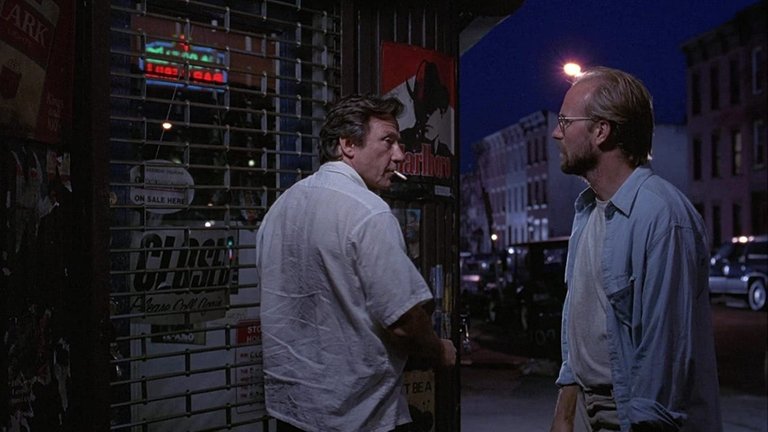
Great films come in all shapes and sizes. The most intriguing of all great films are those where the greatness is anything but obvious. Such films don't feature iconic casts, don't show much of a budget, don't break new grounds of cinema technology, don't deal with important subjects and are far from showing some heart-wrenching dramas. But somehow they manage to defy their seemingly inevitable descent into oblivion and are remembered as little great films. One of those is Smoke, 1995 drama directed by Wayne Wang.
The script for the film was written by Paul Auster and based on his story, commissioned for 1990 Christmas edition of New York Times. The plot starts in Summer of 1990 and revolves around Brooklyn cigar shop managed by Auggie Wren (played by Harvey Keitel). Auggie's clientele consists of all kinds of people and one of regular customers is Paul Benjamin (played by William Hurt), Auggie's good friend and professional writer who is suffering from creative crisis following his wife's death in a random shooting few years ago. One day Paul's own life is saved by Rashid (played by Harold Perrineau Jr.), black teenager with mysterious agenda. Paul is grateful and allows Rashid to stay at his apartment for couple of days, not knowing that this would get him in trouble afterwards, In the meantime, Rashid gets part-time job at the petrol station owned by Cyrus Cole (played by Forest Whitaker), crippled man with troubled past. Auggie's own past comes in the form of Ruby McNutt (played by Stockard Channing), who demands that Auggie take care of her crack-addicted and pregnant daughter Felicity (played by Ashley Judd).
Smoke succeeds because it is one of those rare "art" films that don't try to enthusiastically advertise as such to the audience. The film doesn't have a standard plot - it is made of few stories that easily work without each other - but the audience probably wouldn't care after being won over by Auster's script, dialogue and characters. Wang directs film almost invisibly - the shots are long and plot is carried by dialogue and acting. Rachel Portman's music uses the same low key approach and is hardly noticeable. Same goes for Brooklyn setting with its colourful mix of various races, cultures and ethnicities - it is in the background, but it never overwhelms the scene and allows the audience to concentrate on the important elements of the film.
The significant thing about Smoke is the way in which film's directing technique corresponds with its theme. In one of the scenes the film even implicitly suggests what it tries to do - showing that life can be truly appreciated only through slow careful examination of seemingly insignificant details. Again, nothing of cosmic importance happens in the film, characters don't have their lives changed in any earth-shattering manner but through the course of the story the audience gradually learns to like them, probably recognising little bits of universal reality in their stories. Auster and Wang win the audience over by not shying away from having less than perfect protagonists. The characters in this film are all flawed in one way or another. Two men become best friends because they share nasty, lethal and often very annoying addiction (and Smoke is probably among the last Hollywood's films to portray it as socially acceptable activity); some characters are involved in illegal businesses; some are manipulative; some have ruined other people's lives. Yet they show enough humanity to be forgiven by the audience.
Harvey Keitel, one of the most recognisable character actors of contemporary American cinema, uses Smoke as the rare opportunity to show his abilities in the something close to a leading role. He portrays Auggie as both ordinary and extraordinary man, someone who all of us can remember meeting on the street and whose simple wisdom looks and sounds superior to all the world's philosophers. Keitel chews the scenery, using both Auster's wonderful script and Wang's directing technique - with the long uninterrupted shots and camera revealing almost every pore of his face, the actor simply must display all of his abilities. He does it in such manner than all the other actors are in his shadow despite having memorable performances - Whitaker who makes audience forget about his deformity, Perrineau as enigmatic teenager and Judd in one of the most dislikeable roles of her career.
The best thing about Smoke comes at the very end. Wayne Wang brings not one but two pleasant surprises to the audience. First is the original Auster's Christmas story, presented in the simplest but the most effective manner possible in a memorable scene. Another is that same story being immediately retold during closing credits. The viewers won't mind, though, because the smile would remain on their faces a little bit longer. This achievement, so rare in Hollywood these days, is the main reason why Smoke remains as one of those little great films.
RATING: 8/10 (+++)
(Note: The text in its original form was posted in Usenet newsgroup rec.arts.films.reviews on March 30th 2004)
Blog in Croatian https://draxblog.com
Blog in English https://draxreview.wordpress.com/
Cent profile https://beta.cent.co/@drax
Minds profile https://www.minds.com/drax_rp_nc
Uptrennd profile https://www.uptrennd.com/user/MTYzNA
Brave browser: https://brave.com/dra011
BTC donations: 1EWxiMiP6iiG9rger3NuUSd6HByaxQWafG
ETH donations: 0xB305F144323b99e6f8b1d66f5D7DE78B498C32A7
